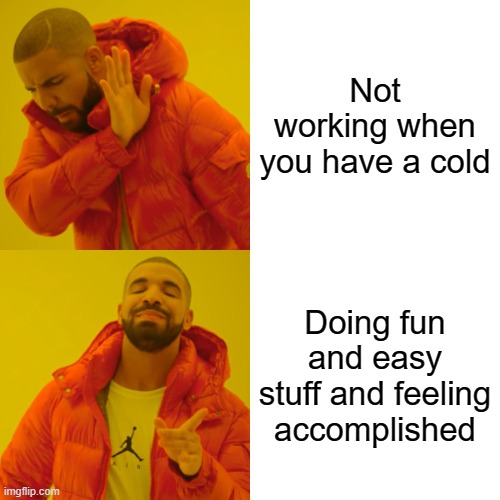One of the most common (and generally sound) writing advice is to write with your audience in mind. What’s their pain point? And how can you fix their problem?
Except, I sometimes do things the other way on my blog. I take my pain point and write it in a way that will relate to my audience.
This usually happens when I keep reading articles that are supposedly targeted toward me but I can’t relate to at all. And I’m not a unicorn. Chances are, there are writers who will relate to me.
So I hope this procrastination article speaks to you and that you find it relatable.
As for fixing the problem of procrastination, well… we’ll see.
Fear of what now?
The reason blamed most for procrastination is usually a tie between fear of success and perfectionism.
And when that happens, I usually stop reading whatever that is.
Because I don’t know about you, but I’m not afraid of success. Failure? Oh, yes. Absolutely. Very often. Success? No.
And I’m so not a perfectionist.
I’m by no means a perfectionist.
Sure, I like to check things. I like it when things are done right.
But I never aim for perfect. I aim for grammatically correct (as long as it doesn’t stifle style and voice), factually correct and enjoyable.
Because perfect doesn’t exist. Universally loved and accepted doesn’t exist either. So, why bother? I get that it might be the reason behind the procrastination of some writers. Just not mine.
So why do I procrastinate?
– Overwhelm (also known as overload). Whether it is due to too much information, too many ideas or specific difficulties like monetary or technical, overwhelm blocks me. It renders me frustrated.
– Underwhelm. Something is boring, repetitive and/or takes too long to get to the point. Sometimes it can be hard to figure out whether you are overwhelmed or underwhelmed. The line is thin.
– Writer’s block. How do you pitch something or write when you’re absolutely stuck?
I regularly go through what I call pitching blocks. Yes, I need to pitch guest posts to promote my novels.
And I need to pitch non-fiction article or essay ideas to editors.
But sometimes, the idea is just not there. Or the idea is there, but you can’t find a publication that is a good fit.
Sometimes you get over that hurdle, only to be rejected by the editor. Then it’s back to the drawing board.
I am often working on more than one thing, so complete writer’s block is not a thing for me.
Stuck in one scene? I move on to another. Stuck in one story? Go ahead and work on the other one. Not feeling the fiction muses? I’ll go ahead and write that blog post.
But no matter what form and magnitude writer’s block hits you, it still gets in your way.
It delays your launch plans. It might put a dent in your expected income. It will also occasionally drive you crazy.
Why can’t I find the right, exciting love story for this wonderful character of mine?
Why do I have the perfect premise for a sci-fi thriller but I can’t for the life of me figure out the personalities of my protagonists?
And why can’t I figure out the rules of this alternate universe?
– Fear of failure. Will this (whatever it is that you are learning or working on) be too hard to figure out?
Will the result have too many mistakes and/or look hideous (especially for techie things and/or things that require formatting/design)?
– Health problems. Good luck being proactive and productive when your health is bothering you a great deal.
Sure, conventional wisdom tells you to rest and sit it out, but what if your issues are chronic and the doctors haven’t figured out a solution yet? Just how much rest can you afford without going crazy and/or broke?
– Fun/being social. Yes, I admit binging Netflix too many times. Luckily, I turn that into content.
And what is sitting with friends for an hour longer? Although, if I knew Covid would hit, I would have procrastinated even harder on this front.
– Fear of failure/rejection.
I’ve been pitching for over a decade, and I still occasionally procrastinate on this.
I also call it “fear of more (unpaid) work”.
Because, if the editor rejects you, you have to look into other magazines and do more research and tweak your pitch. Then wait. Then follow up. Then maybe follow up once more before moving on. Rinse and repeat.
And if one novel doesn’t turn into the hit you are hoping for, you have to reconsider your entire marketing strategy, study some more, and gasp!, write another book – while dealing with fear and anxiety. What if this one also doesn’t work out the way I want it to work out?
Fear of more, endless, (initially) unpaid work in sight is real.
I don’t mind the work; it’s the uncertainty that gets to me. The feeling of working as hard as you can and still feeling you are not getting anywhere.
– Being intrigued by how the human mind works and how/why everyone does things. Have you ever watched videos of apartment rentals in New York even though you don’t live in the States and aren’t planning to move there anytime soon? I have.
For me, the peak of this type of procrastination is watching videos or reading about why people procrastinate. Like, I know why I do it. Why do other people? How? How often? How normal/rare/weird am I?
If this is you, you just might enjoy this Ted talk. It’s called Inside the mind of the Procrastinator.
*
Procrastination isn’t the end of the world. Or the end of productivity.
I’ve never missed a deadline imposed by an editor or client, including when they asked me to set the deadline. It is only right and professional to turn in my work when or before I promised I would.
Can/do I perform the same level of “professional” courtesy if I set the deadline for myself for a passion project? I think you know the answer to that one. (No, I can’t.)
Part of the reason is, I believe, my personality. I strongly recommend Gretchen Rubin’s bestselling book Better than Before (Amazon aff. link) about habits, one of the only books I’ve read on the topic that takes your personality into account before drawing conclusions and offering advice.
I’m a questioner/rebel (terms coined by Rubin). I question everything, and I only do things if I’m satisfied by the reason. I also rebel. I do something only if I want to do it. So even if I happen to set a deadline, I would rebel against me.
Does it mean I don’t get things done?
Of course not. But it is unlikely for me to say “I’ll finish this book by March 15” and then have it finished by March. I will do it as soon as possible, but I can’t give a date. And if I did, I wouldn’t stick to it. I’d probably finish it even on the 14th or the 16th of March just to spite my goal-setting self.
I’m trying to tone down the Questioner/Rebel in me, and luckily, I’m a total obliger when it comes to dealing with other professionals.
I’m trying to understand why I procrastinate and come up with methods to tone it down. And when I can’t tone it down, I come up with reasons to make it pay.
Make your procrastination work for you
– Watched too many episodes in a row? I pitch and write articles on it in a row while everything is still fresh in my mind.
– Spent days socializing with friends as opposed to working? I am grateful for the fun I had.
And I might or might not use the stories we shared for future inspiration. Always with their permission, of course.
*
So, there you go. This has been the procrastination analysis of a non-perfectionist.
If I regret any procrastination, it’s usually the mindless social media browsing or YouTube watching before I go to bed. But even then, those are my creatively and energetically dead hours.
And let’s face it, cute cats can’t be that bad for our mental health.
Could I be working instead? If I could, trust me, I’d be working.
Could I be doing something else? If there was a way I could be out safely dancing and mingling outside, I’d be doing that.
As long as I don’t hang around online past midnight (which is the latest I can go to bed where my brain and body will allow me to wake up properly in the morning), I’ll be fine.
And in those “mindless” strolling moments, I’ll still find hilarious memes, story ideas, what I want from a rental apartment, what (not) to do with my social media, where I (don’t) want to travel, and beyond.
*
Here’s what I want you to take away from this post:
– Not all procrastination is bad.
– Not everyone procrastinates the same way or for the same reasons.
– You can make procrastination work for you.
– Reading about other people’s procrastination reasons (and ways) will be helpful to a certain extent. But you might decide you have to work on it if you are filled with regret and disappointment afterward.
*
Why do you procrastinate? How do you procrastinate? And what do you do about it? Let me know in the comments.



